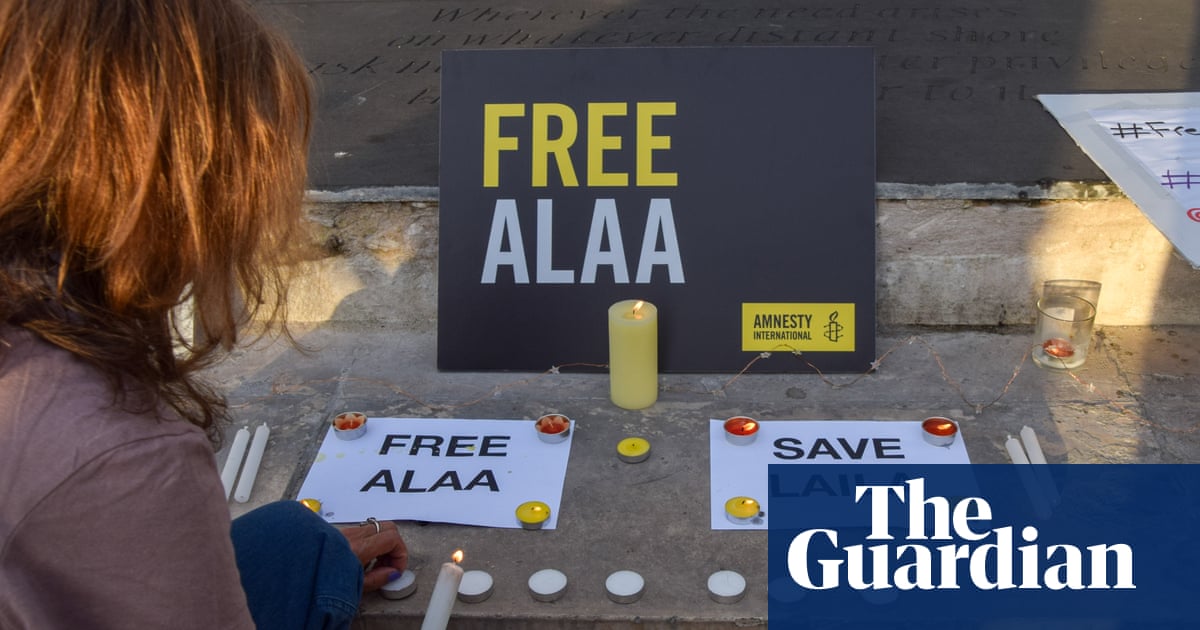The UK government should impose sanctions on key figures in the Egyptian government in response to its refusal to release the British-Egyptian human rights activist Alaa Abd el-Fattah, Labour’s most prominent human rights lawyer has proposed.
Writing in the Guardian, Helena Kennedy called for the UK to take the case to the international court of justice, asFrance has recentlydone in the case of a national held by Iran.
Lady Kennedy said the moves were necessary as Abd el-Fattah’s 69-year-old mother, Leila Soueif, enters the 243rd dayof her hunger strikeat St Thomas’ hospital in London. She started the strike to secure either British consular access to her son or his release. Doctors have told the family she is at risk of sudden death, but her body has also adapted to months without food. It is the second time she has been hospitalised.
Her son has been held in various forms of detention in Egypt for more than 10 years, but completed his latest five-year jail sentence last September. However, the Cairo judiciary kept him in prison on the grounds that the two years he had spent in jail prior to his sentencing did not count as part of his five years.
Soueif’s two daughters remain by her bedside, but her family say she is determined not to back down and will see this through to a resolution.
Kennedy has urged the British government to elevate the case to a much higher level, including introducing “sanctions against any Egyptian authorities responsible for Abd el-Fattah’s continued detention beyond the end of his five-year sentence”, a course she has recommended to the Commons foreign affairs select committee.
She is also calling for holding off any new trade and investment cooperation with Egypt. Overall, she says, the UK government’s approach in the case has been too timid and Soueif, a distinguished human rights activist, “wants more than anything else to reunite her son with his own 14-year-old son, who lives in Brighton and has barely been able to spend time with his father”.
Kennedy said: “Laila’s bravery and fortitude is astonishing. The time for relying solely on polite diplomacy is long past: the prime minister must demonstrate his strength and resolve on this case.”
Last week, Kennedy joined the former British ambassador to Egypt John Casson, the former Foreign Office minister Peter Hain and thecampaigner Richard Ratcliffein urging “caution against travel to Egypt”.
Kennedy said: “In light of what we have learned from Alaa’s case, the British government must make clear that a British citizen who falls foul of the police state in Egypt cannot expect fair process, nor normal support from the British government. Hundreds of thousands of British citizens travel to Egypt each year, making a major contribution to the country’s economy, and the truth is we can’t guarantee their rights. The Egyptian government will undoubtedly take notice if its failure to abide by the rule of law starts affecting British hotel bookings for the winter season.”
The UK prime minister has twice phoned the Egyptian president to urge him to show clemency, but no punitive measures have been threatened by the UK government.
Soueif’s determination has led to vigils being held for her in Berlin, Washington and Damascus.
Omar Robert Hamilton, a nephew of Soueif who was with his aunt over the weekend, said she had told him “my course is irreversible”. He added: “My aunt’s resolve has only grown stronger in hospital. She is receiving the messages of support and solidarity from around the world, and she will see her struggle through to the end – whatever that end is.”
More than 120 former Egyptian political prisoners have also appealed to the president, Abdel Fatah al-Sisi, to show clemency. They wrote: “What unites us is that we have been inside this circle, but what distinguishes us from Alaa and others still in detention is that the state has made decisions – at various stages – to give a presidential pardon, or release after the extension of our sentences has expired. And today, years or months after we left jail, we were not a threat or likely to damage to public safety, we simply returned to our lives, trying to restore what was lost.”
